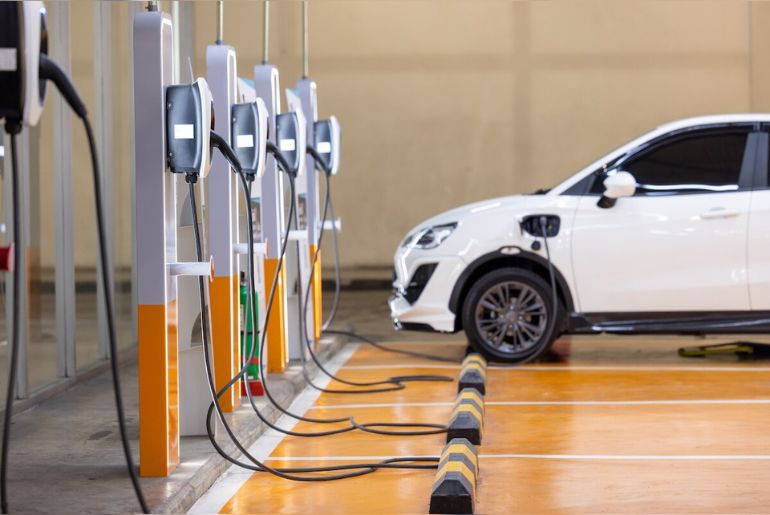The Government of India has introduced a series of ambitious initiatives and policy measures to enhance the electric vehicle (EV) ecosystem in the country. These efforts span demand incentives, manufacturing support, infrastructure development, regulatory reforms, and advanced R&D in battery technologies.
According to an official release by the Press Information Bureau (PIB), the government’s comprehensive EV strategy includes multiple flagship schemes designed to boost adoption, reduce import dependence, and position India as a global leader in sustainable mobility.
Key Schemes and Initiatives Supporting the EV Sector
1. FAME India Scheme Phase-II (2019–2024):
With a total outlay of ₹11,500 crore, the FAME-II scheme provided demand incentives for electric two-, three-, and four-wheelers and extended grants for electric buses and the establishment of EV public charging stations (EV PCS). It was operational from April 1, 2019, to March 31, 2024.
2. PM E-DRIVE Scheme (2024–2026):
Launched on April 1, 2024, with a budget of ₹10,900 crore, the PM Electric Drive Revolution in Innovative Vehicle Enhancement (PM E-DRIVE) Scheme supports a wide range of EVs, including e-2Ws, e-3Ws, e-trucks, e-buses, and e-ambulances. It also funds the setup of EV PCS and upgrades of testing facilities.
3. PLI Scheme for Advanced Chemistry Cells (ACC):
Approved on May 12, 2021, with a budget of ₹18,100 crore, this Production Linked Incentive (PLI) scheme aims to establish a competitive domestic ecosystem for manufacturing 50 GWh of advanced chemistry cell batteries.
4. PLI Scheme for Automobile and Auto Components (PLI-Auto):
Launched on September 23, 2021, with an outlay of ₹25,938 crore, this scheme provides incentives for manufacturing Advanced Automotive Technology (AAT) products, with at least 50% Domestic Value Addition (DVA).
5. Scheme for Promotion of Manufacturing of Electric Passenger Cars in India (SPMEPCI):
Notified on March 15, 2024, the scheme mandates a minimum investment of ₹4,150 crore by applicants and requires a 25% DVA by the third year and 50% by the fifth year of implementation.
6. PM e-Bus Sewa – Payment Security Mechanism (PSM):
Announced on October 28, 2024, this scheme, with an outlay of ₹3,435.33 crore, is designed to support the deployment of over 38,000 electric buses. It ensures payment security for e-bus operators in case of default by Public Transport Authorities (PTAs).
Regulatory and Policy Measures by Other Ministries
-
The Ministry of Power issued the “Guidelines for Installation and Operation of EV Charging Infrastructure—2024” to standardise and expand charging infrastructure, including simplified electricity connections.
-
The Ministry of Finance reduced GST on EVs from 12% to 5% to make them more affordable.
-
The Ministry of Road Transport & Highways (MoRTH) exempted EVs from permit requirements and mandated green licence plates. States have been advised to waive road tax on EVs.
-
The Ministry of Housing and Urban Affairs amended the Model Building Bye-Laws to require EV charging infrastructure in new private and commercial buildings.
Research and Development Support
The government is heavily investing in R&D through its flagship schemes:
-
PLI-Auto, PLI-ACC, and SPMEPCI recognise engineering R&D and product development as eligible investments.
-
Under the Capital Goods Scheme of MHI, up to 80% of R&D project costs—including EV technologies—are supported, with institutes like IITs and IISc leading research. The remaining 20% is funded by industry partners.
-
₹780 crore under PM E-DRIVE is earmarked for upgrading EV testing agencies, which also boosts R&D capacity.
Centres of Excellence have been established for niche technologies not available domestically.
Advanced Battery Technology Development
The International Advanced Research Centre for Powder Metallurgy and New Materials (ARCI), Hyderabad, under the Department of Science and Technology (DST), has developed several next-generation battery technologies:
-
Lithium, Sodium-ion, and lithium-sulfur batteries
-
Cobalt-free cathode materials (LiMnFePO₄, LiNi₀.₅Mn₁.₅O₄)
-
Hard carbon anodes from bio-waste for sodium-ion batteries
-
Aluminium-ion batteries as alternatives to Li-ion
-
Advanced composite phase change materials (PCMs) for thermal management
-
Hybrid models for battery life prediction
-
Scalable methods for metal alloy porosity tuning for energy storage
Conclusion
India’s EV roadmap is evolving through a multi-pronged approach—integrating financial incentives, robust infrastructure, R&D support, and strong regulatory frameworks. With these initiatives, the government aims to create a self-reliant EV ecosystem, reduce carbon emissions, and make India a hub for next-gen clean mobility technologies.

